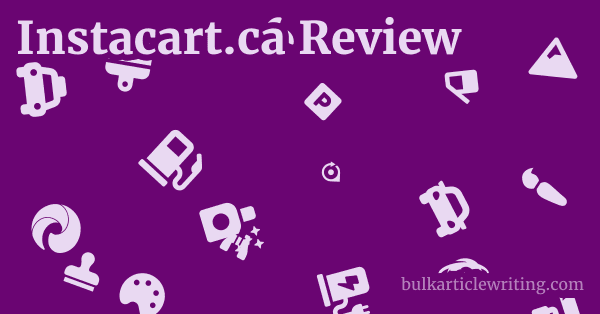When considering Instacart.ca, it’s not enough to just look at its features; we must critically compare it to alternatives that align with ethical principles. The core conflict with Instacart.ca stems from its inclusion of alcohol and potentially other problematic categories, making it unsuitable for those committed to ethical consumption.
The Instacart.ca Business Model
Instacart.ca operates on a broad marketplace model, aiming for maximum convenience by aggregating a vast array of stores and products.
- Market Dominance: Instacart claims to be “The largest online grocery marketplace in North America,” with “1 billion products available to shop across the catalog” and “Millions of orders delivered or picked up yearly.” This scale makes it highly accessible.
- Partnerships: They partner with “80,000 stores from local grocers to chain stores,” which gives users extensive choice, including popular stores like Costco (instacart.ca costco).
- Convenience-Driven: The entire service is built around saving time and effort for the consumer, from seamless ordering to same-day delivery.
However, this convenience-driven model often comes at the expense of ethical vetting. The platform prioritizes availability over permissibility, leading to the issues discussed.
Ethical Alternatives: A Different Approach
Ethical alternatives operate on a different philosophy, prioritizing the source, nature, and impact of products and services. These typically fall into categories that ensure compliance with specific moral or religious guidelines.
- Direct-to-Consumer Halal Providers: Instead of a general marketplace, services specializing in halal meat or halal-certified pantry items ensure that everything offered meets Islamic dietary standards. This removes the burden of vetting each item from the consumer.
- Pros: Guaranteed compliance, supports ethical suppliers, specialized product knowledge.
- Cons: Limited product range (focused on specific categories), may require multiple sources for a full grocery list.
- Local Farmers’ Markets and CSA Programs: These models inherently promote ethical sourcing, local economy, and often sustainable practices.
- Pros: Freshness, seasonal produce, direct support for farmers, community engagement, often organic.
- Cons: Limited availability (seasonal, specific hours), less variety than supermarkets, requires physical presence.
- Specialty Stores with Ethical Standards: Some smaller, independent stores or co-ops focus exclusively on organic, fair trade, or ethically produced goods.
- Pros: Curated selection, knowledgeable staff, strong ethical ethos.
- Cons: Limited geographical reach, potentially higher prices.
- DIY and Skill-Based Alternatives: For household items, personal care, and even certain foods, making items yourself or learning skills to produce them can be a highly ethical and empowering alternative. This reduces reliance on external, potentially problematic, supply chains.
- Pros: Full control over ingredients/materials, cost-effective in the long run, reduces waste, promotes self-sufficiency.
- Cons: Requires time, effort, and learning new skills.
The comparison highlights a fundamental divergence: Instacart.ca prioritizes convenience and breadth at all costs, while ethical alternatives prioritize compliance and responsible consumption. For those seeking to align their purchasing habits with their values, avoiding platforms like Instacart.ca and actively seeking out the alternatives is the path forward.
|
0.0 out of 5 stars (based on 0 reviews)
There are no reviews yet. Be the first one to write one. |
Amazon.com:
Check Amazon for instacart.ca vs. Ethical Latest Discussions & Reviews: |

Leave a Reply